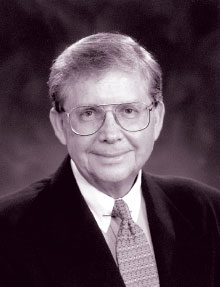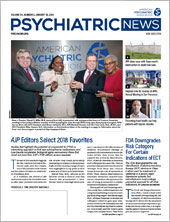Lewis Judd, M.D., a former vice president of APA and director of the National Institute of Mental Health (NIMH), died December 16, 2018. He was 88 years old.
Judd was a neurobiologist and expert in psychopharmacology who was a pivotal figure in helping psychiatry move toward a more neurobiologically informed understanding of mental illness. He was chair of the Department of Psychiatry at the University of California, San Diego (UCSD), from 1977 to 2013, taking a leave of absence to serve as director of NIMH from 1988 to 1992.
In an interview published in Psychiatric Services in January 1988, just after becoming director of NIMH, Judd summed up the optimism that preceded the “Decade of the Brain.” That designation was given to the 1990s by President George H.W. Bush in a collaborative effort between the Library of Congress and the National Institutes of Health to better inform the public about brain research.
“There is an accumulation of evidence that many mental disorders emanate from dysfunctional brain mechanisms that can be identified and described and, when fully understood, rather specifically and precisely ameliorated and treated,” Judd said in the interview. “We are, I believe, on the threshold of a golden era that will result in the amelioration of suffering for millions of people.”
Igor Grant, M.D., who is the Mary Gilman Marston Distinguished Professor and chair of the Department of Psychiatry at UCSD, said Judd’s leadership laid the groundwork for today’s BRAIN (Brain Research through Advancing Innovative Neurotechnologies) Initiative, begun under President Barack Obama.
“Besides contributing to our understanding of the lifelong course of mood disorders and their treatment, as NIMH director, Lew Judd was instrumental in proposing the Decade of the Brain, which was the foundation of today’s NIH brain initiatives,” he told Psychiatric News. “Passionate about educating the next generation of mental health professionals, he established training programs at UCSD not only for psychiatry residents and child fellows but also for clinical psychologist trainees.”
Although widely acknowledged for his role in advancing the neurobiological understanding of mental illness, Grant said that Judd did not reject psychotherapy or psychodynamic approaches to treatment.
“He understood that when you talk to people, you are talking to the brain,” Grant said. “Lew’s contribution was the centrality of the brain, but he knew there were multiple ways to access it.”
APA leaders said Judd’s contributions to psychiatry are lasting. “APA mourns the passing of Dr. Judd, a true giant in the clinical and research aspects of psychiatry,” said APA President Altha Stewart, M.D. “He was an early champion of moving the field to the empirical evidence-based science we know today and leaves a legacy that successfully shows the blending of psychiatry, neuroscience, and psychology. His career is an excellent model for our path to the future of the field.”
APA CEO and Medical Director Saul Levin, M.D., M.P.A., recalled Judd as a colleague during Levin’s service as a special advisor to Frederick Goodwin, M.D. Goodwin was the director of the Alcohol, Drug Abuse, and Mental Health Administration, which oversaw NIMH at the time. “Lew Judd was a great researcher, leader, and visionary thinker,” Levin said. “He also was a terrific mentor to me during those years. I honor and thank him for all he did for psychiatry, our APA members, and our patients.”
Judd received his medical degree and training in adult and child psychiatry from UCLA. He was a founding member of the Scientific Council of the Brain and Behavior Research Foundation. ■

